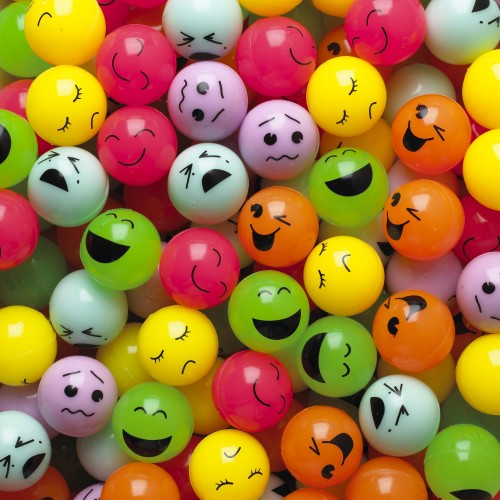If, like me, you have a fondness for clever, animated films, you will have experienced a range of emotions watching the ingenious and artfully designed Pixar movie, Inside Out. It is here we meet the five dominant emotions that run humans: Anger, Disgust, Fear, Sadness and Joy, as they play havoc in the life of a young girl moving through the stages of human transformation.
Smart researchers at the University of California, Berkeley, have dedicated study on emotions and the subtleties that exist between different feelings. They have expanded the long-held belief in the standard five emotions into a far more comprehensive palette of 27 emotions, that run the gamut of feelings from admiration to surprise. This expansion of our emotional vocabulary asks us to become more discerning with our emotional language and to refine our sensors to detect the nuances that exist between fear and horror or entrancement and adoration.
When my children were little, I would strive to read them a story each night whilst they fell asleep. They could choose the book of the night and there were times when their option would cause my end-of-day weariness to mentally bemoan the drag of reading a book I didn’t enjoy. If, however they opted for one of my favourites, ‘The Way I Feel’, by Janan Cain I knew my own tiredness would be transformed into good energy – the book always had a positive effect on them and me.
Building emotionally literate children is as important as establishing the foundations of reading, writing and arithmetic. In an age where emotional intelligence has been dumbed down to responding to Facebook when it asks you to share how you’re feeling, the world is crying out for citizens who can identify their emotions. Emotionally literate people can choose to stay with their feelings long enough to know how they want to respond rather than reacting with an angry tweet or a thoughtlessly intimate share across their entire social media contact list.
The word feeling is not there just to denote the physical sensation of touch, but also describes experiences we have like the feeling of joy or sadness which, in psychological terms is a subjective practice based on our past experiences of that feeling. Our memories are tightly enmeshed with feelings. We create representations in our minds of past events and these in turn establish a life script we use to predict how our life should unfold according to our map of the feelings that we welcome or reject.
Feelings we don’t like, or prefer not to own like, anger, awkwardness or contempt can be conveniently left unscripted. We choose not to commemorate certain feelings and deprive our life schemas of remembrances of the things we don’t like to feel. Feelings that unnerve us, even through the proxy of a recalled story, can be convieniently disregarded. The trouble with being human is that unexamined feelings have a residual impact on our physical and psychological well-being or the health of our relationships. It turns out emotional ignorance has a price.
Why should mature our emotional shrewdness? Well look around: all sorts of emotional dullards are bumping into life and one another without empathy and continuously attempting to censor their experience of life to either only the good feelings or into something logical and explainable. Moreover, emotionally mute humans are prone to manipulation from the media and governments that favour the removal of civil liberties.
Marketing has long played master to our emotional muddle, enslaving us to beliefs that beauty products and celebrity endorsed equipment will make us feel happy, excited, desirable or beautiful. Even useful products are designed to respond to our desires for economic freedom, altruistic expression or to a simpler ease of living. Knowing what we need, what we feel and what we can do to accept and transform our feelings into something more useful for ourselves or others is the hallmark of an emotionally developed human.
The revival of the tech-noir film, Blade Runner, has reminded us of the apparent differences between human-made replicants and human beings. The themes of the film and its 2017 version, Blade Runner 2049, explore reality and humanity with the replicants ironically showing more sentiments and passion than the humans that created them.
In the latest movie, the replicant, K. asks, “I have memories, but I can’t tell if their real.” After analysing the memory, Dr. Ana Stelline says, ‘It’s real. Someone lived this.” She knows real memories are associated with the feelings created during that experience. As the replicants ascend the evolutionary spiral towards humanity the two things they strive to achieve are what differentiate humans: our capacity for empathy and the ability to create life.
We can all do with greater levels of empathetic adeptness when it comes to handling relationships with others and with our own good selves by reading emotions judiciously. In the absence of emotional traffic lights on people’s foreheads we need to interpret signals and scan our own physiology to interpret how we are experiencing events. We need a just-in-time translator giving us an authentic read on our calibrated feelings and the responses we get from others no matter how practiced their deadpan expressions.
How much wasted time and unwarranted conflict could be saved if we registered our full catalogue of feelings and talked about these sentiments without censure and censorship. This is not about a banal declaration just for the sake of sharing (à la Facebook). Imagine a future where we recognise our triggers and the myriad of emotional responses we have towards people and situations and use this same acuity to interpret the experience we cause for others.
We could then recognise a misstep in a relationship or a beguiling moment from advertising or the requisite time and space needed for grief or love or confusion. We could then kindly offer up corrective restoration or the necessary self-compassion to transform conflict, either internal or external, into something more useful. It’s emotional intelligence, but not as we’ve known it before.
Raphael Cushnir’s book, The One Thing Holding You Back, reminds us that emotional intelligence is not enough to navigate the full experience of life. Connecting with the complete spectrum of our emotions (all 27 of the recognised ones) will, in fact, help us achieve a deeper experience of life. The reverse holds true: failure to connect with our full range of emotions will limit our experience of life.
Cushnir tells us that whenever we feel blocked from living the dreams we have for our lives it’s because we are not yet willing or able to feel the emotions that are associated with those dreams. Accessing the technicolor splendour of our emotions and learning to surf those emotions without distraction or overt obsession frees us up to catch the waves of emotion that will pilot us towards our dreams. It might be well worth our while to catch that next wave of emotion and surf it to its shore. Our very futures may depend upon it.







Wonderful reality check Cal. I especially loved this statement – “It might be well worth our while to catch that next wave of emotion and surf it to its shore”.
Thanks – yes I might be riding one of those waves right now, wondering what shore I am going to beach against